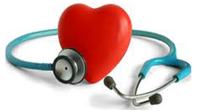High Cholesterol
WHAT IS IT?
High blood cholesterol (ko-LES-ter-ol), is when too much cholesterol is in your blood.
Also Known As: Hypercholesterolemia, Hyperlipidemia
Basic Facts
Cholesterol is a fat-like substance that is made in your body. Cholesterol is also in some foods that you eat. Your body needs some cholesterol to work the right way. Your body makes all the cholesterol it needs.
Too much cholesterol in the blood is called high blood cholesterol or hypercholesterolemia.
High blood cholesterol increases the chance of having a heart attack or some other symptom of heart disease, like chest pain (angina).
Lowering cholesterol is important for everyone-young, middle-aged, and older adults, and both men and women.
Eating too much saturated fat and cholesterol raises the level of cholesterol in your blood.
Too much cholesterol in your blood can build up in the walls of arteries. This is called plaque.
There are no signs or symptoms of high blood cholesterol. Many people don't know that their cholesterol level is too high.
High blood cholesterol is diagnosed by checking cholesterol levels in your blood.
A blood test called a lipoprotein profile measures the cholesterol levels in your blood and is the recommended test.
It is important that everyone age 20 and older get their cholesterol checked at least once every 5 years.
Many people are able to lower their cholesterol levels by eating a low saturated fat and low cholesterol diet, exercising, and losing weight if needed.
Some people will need to take medicines prescribed by their doctor to lower their cholesterol in addition to eating a low saturated fat and low cholesterol diet, exercising, and losing weight if needed.
What Is Cholesterol
To understand high blood cholesterol (ko-LES-ter-ol), it is important to know more about cholesterol.
Cholesterol is a waxy, fat-like substance that is found in all cells of the body. Your body needs some cholesterol to work the right way. Your body makes all the cholesterol it needs.
Cholesterol is also found in some of the foods you eat.
Your body uses cholesterol to make hormones, vitamin D, and substances that help you digest foods.
Blood is watery, and cholesterol is fatty. Just like oil and water, the two do not mix. To travel in the bloodstream, cholesterol is carried in small packages called lipoproteins (lip-o-PRO-teens). The small packages are made of fat (lipid) on the inside and proteins on the outside. Two kinds of lipoproteins carry cholesterol throughout your body. It is important to have healthy levels of both:
Low-density lipoprotein (LDL) cholesterol is sometimes called bad cholesterol.
High LDL cholesterol leads to a buildup of cholesterol in arteries. The higher the LDL level in your blood, the greater chance you have of getting heart disease.
High-density lipoprotein (HDL) cholesterol is sometimes called good cholesterol.
HDL carries cholesterol from other parts of your body back to your liver. The liver removes the cholesterol from your body. The higher your HDL cholesterol level, the lower your chance of getting heart disease.
What is High Blood Cholesterol?
Too much cholesterol in the blood, or high blood cholesterol, can be serious. People with high blood cholesterol have a greater chance of getting heart disease. High blood cholesterol on its own does not cause symptoms, so many people are unaware that their cholesterol level is too high.
Cholesterol can build up on the walls of your arteries (blood vessels that carry blood from the heart to other parts of the body). This buildup of cholesterol is called plaque (plak). Over time, plaque can cause narrowing of the arteries. This is called atherosclerosis (ath-er-o-skler-O-sis), or hardening of the arteries.
Special arteries, called coronary arteries, bring blood to the heart. Narrowing of your coronary arteries due to plaque can stop or slow down the flow of blood to your heart. When the arteries narrow, the amount of oxygen-rich blood is decreased. This is called coronary artery disease (CAD). Large plaque areas can lead to chest pain called angina (an-JI-nuh or AN-juh-nuh). Angina happens when the heart does not receive enough oxygen-rich blood. Angina is a common symptom of CAD.
Some plaques have a thin covering and burst (rupture), releasing fat and cholesterol into the bloodstream. The release of fat and cholesterol may cause your blood to clot. A clot can block the flow of blood. This blockage can cause angina or a heart attack.
Lowering your cholesterol level decreases your chance for having a plaque burst and cause a heart attack. Lowering cholesterol may also slow down, reduce, or even stop plaque from building up.
Plaque and resulting health problems can also occur in arteries elsewhere in the body.
Causes
A variety of things can affect the cholesterol levels in your blood. Some of these things you can control and others you cannot.
You can control:
- What you eat. Certain foods have types of fat that raise your cholesterol level.
- Saturated fat raises your low-density lipoprotein (LDL) cholesterol level more than anything else in your diet.
- Trans fatty acids (trans fats) are made when vegetable oil is hydrogenated to harden it. Trans fatty acids also raise cholesterol levels.
- Cholesterol is found in foods that come from animal sources, for example, egg yolks, meat, and cheese.
- Your weight. Being overweight tends to increase your LDL level, lower your high-density lipoprotein (HDL) level, and increase your total cholesterol level.
Your activity. Lack of regular exercise can lead to weight gain, which could raise your LDL cholesterol level. Regular exercise can help you lose weight and lower your LDL level. It can also help you raise your HDL level.
You cannot control:
Heredity. High blood cholesterol can run in families. An inherited genetic condition (familial hypercholesterolemia) results in very high LDL cholesterol levels. It begins at birth, and may result in a heart attack at an early age.
Age and sex. Starting at puberty, men have lower levels of HDL than women. As women and men get older, their LDL cholesterol levels rise. Younger women have lower LDL cholesterol levels than men, but after age 55, women have higher levels than men.
Symptoms
There are usually no signs or symptoms of high blood cholesterol. Many people don't know that their cholesterol level is too high.
Everyone age 20 and older should have their cholesterol levels checked at least once every 5 years. You and your doctor can discuss how often you should be tested.
Diagnosis
High blood cholesterol is diagnosed by checking levels of cholesterol in your blood. It is best to have a blood test called a lipoprotein profile to measure your cholesterol levels. Most people will need to not eat or drink anything (fast) for 9 to 12 hours before taking the test.
The lipoprotein profile will give information about your:
- Total cholesterol
- Low-density lipoprotein (LDL) bad cholesterol: the main source of cholesterol buildup and blockage in the arteries
- High-density lipoprotein (HDL) good cholesterol: the good cholesterol that helps keep cholesterol from building up in arteries
- Triglycerides: another form of fat in your blood
Cholesterol levels are measured in milligrams (mg) of cholesterol per deciliter (dL) of blood. See how your cholesterol numbers compare to the tables below.
Total Cholesterol Level
Total Cholesterol Category
Less than 200 mg/dL Desirable
200-239 mg/dL Borderline high
240 mg/dL and above High
LDL Cholesterol Level
LDL Cholesterol Category
Less than 100 mg/dL
Optimal
100-129 mg/dL
Near optimal/above optimal
130-159 mg/dL
Borderline high
160-189 mg/dL
High
190 mg/dL and above
Very high
HDL Cholesterol Level
HDL Cholesterol Category
Less than 40 mg/dL
A major risk factor for heart disease
40-59 mg/dL
The higher, the better
60 mg/dL and above
Considered protective against heart disease
Triglycerides can also raise your risk for heart disease. If you have levels that are borderline high (150-199 mg/dL) or high (200 mg/dL or more), you may need treatment. Things that can increase triglyceride levels include:
Overweight
Physical inactivity
Cigarette smoking
Excessive alcohol use
Very high carbohydrate diet
Certain diseases and drugs
Genetic disorders
Treatment
The main goal of cholesterol-lowering treatment is to lower your low-density lipoprotein (LDL) level enough to reduce your risk of having a heart attack or diseases caused by hardening of the arteries. In general, the higher your LDL level and the more risk factors you have, the greater your chances of developing heart disease or having a heart attack. (A risk factor is a condition that increases your chance of getting a disease.) Some people are at high risk for heart attack because they already have heart disease. Other people are at high risk for developing heart disease because they have diabetes or a combination of risk factors for heart disease.
There are two main ways to lower your cholesterol:
Therapeutic Lifestyle Changes (TLC)-includes a cholesterol-lowering diet (called the TLC Diet), physical activity, and weight management. TLC is for anyone whose LDL is above goal.
Drug Treatment-if cholesterol-lowering drugs are needed, they are used together with TLC treatment to help lower your LDL.
The higher your risk for heart disease, the lower your LDL goal will be. Your doctor will set your LDL goal. Using the following guide, you and your doctor can develop a possible plan for treating your high blood cholesterol.
Category I, highest risk, your LDL goal is less than 100 mg/dL.
Your LDL Level
Treatment
If your LDL is 100 or above
You will need to begin the TLC Diet together with drug treatment.
Even if your LDL is below 100
You should follow the TLC Diet on your own to keep your LDL as low as possible.
Category II, next highest risk, your LDL goal is less than 130 mg/dL.
Your LDL Level
Treatment
If your LDL is 130 mg/dL or above
You will need to begin the TLC Diet.
If your LDL is 130 mg/dL or more after 3 months on the TLC Diet
You may need drug treatment along with the TLC Diet.
If your LDL is less than 130 mg/dL
You will need to follow the Heart Healthy Diet.
Category III, moderate risk, your LDL goal is less than 130 mg/dL.
Your LDL Level
Treatment
If your LDL is 130 mg/dL or above
You will need to begin treatment with the TLC Diet.
If your LDL is 160 mg/dL or more after you have tried the TLC Diet for 3 months
You may need drug treatment along with the TLC Diet.
If your LDL is less than 130 mg/dL
You will need to follow the Heart Healthy Diet.
Category IV, low to moderate risk, your LDL goal is less than 160 mg/dL.
Your LDL Level
Treatment
If your LDL is 160 mg/dL or above
You will need to begin the TLC Diet.
If your LDL is still 160 mg/dL or more after 3 months on the TLC Diet
You may need drug treatment along with the TLC Diet.
If your LDL is less than 160 mg/dL
You will need to follow the Heart Healthy Diet.
Lowering Cholesterol With TLC
TLC is a set of lifestyle changes you can make to help lower your LDL cholesterol. The main parts of TLC are:
The TLC Diet, which recommends:
Limiting the amount of saturated fat and cholesterol you eat.
Eating only enough calories to achieve or maintain a healthy weight.
Increasing the soluble fiber in your diet. For example, oatmeal, kidney beans, and apples are good sources of soluble fiber.
Adding cholesterol-lowering food, such as margarines that contain plant sterol or stanol esters that lower cholesterol for some people.
Weight management:
Losing weight if you are overweight can help lower LDL. Weight management is especially important for those with a group of risk factors that includes high triglyceride and/or low HDL levels and being overweight with a large waist measurement (more than 40 inches for men and more than 35 inches for women).
Physical activity:
Regular physical activity is recommended for everyone. It can help raise HDL levels and lower LDL levels, and is especially important for those with high triglyceride and/or low HDL levels who are overweight with a large waist measurement.
Cholesterol-Lowering Medicines
Along with suggesting that you change the way you eat and exercise regularly, your doctor may prescribe medicines to help lower your cholesterol. Even if you begin drug treatment, you will need to continue TLC. Drug treatment controls but does not "cure" high blood cholesterol. Therefore, you must continue taking your medicine to keep your cholesterol level in the recommended range.
The five major types of cholesterol-lowering medicines are:
Statins
Very effective in lowering LDL (bad) cholesterol levels
Safe for most people
Rare side effects to watch for are liver and muscle problems
Bile Acid Sequestrants (seh-KWES-trants)
Help lower LDL cholesterol levels
Sometimes prescribed with statins
Not usually prescribed as the only medicine to lower cholesterol
Nicotinic (Nick-o-TIN-ick) Acid
Lowers LDL cholesterol and triglycerides, and raises HDL (good) cholesterol
Should only be used under a doctor's supervision
Fibrates
Lower triglycerides
May increase HDL (good) cholesterol levels
When used with a statin, may increase the chance of muscle problems
Ezetimibe
Lowers LDL cholesterol
May be used with statins or alone
Acts within the intestine to block cholesterol absorption
When you are under treatment, you will be checked regularly to:
Make sure your cholesterol level is controlled
Check for other health problems
You may take medicines for other health problems. It is important that you take ALL medicines as your doctor prescribes. The combination of medicines may lower your risk for heart disease or heart attack.
When trying to lower your cholesterol or keep it low, it is important to remember to follow your treatments for other conditions you may have, such as high blood pressure. Get help with quitting smoking and losing weight if they are risk factors for you.
If you have other questions, please email Mary Zook at mary.zook@cvcde.com. If you have urgent questions, please call 911 or call our office at 302-644-1233




